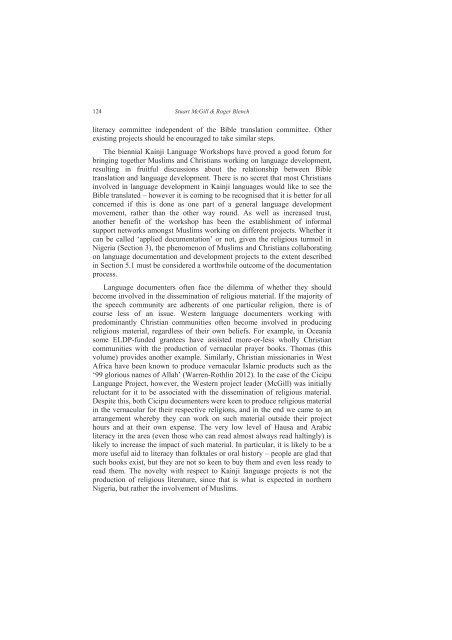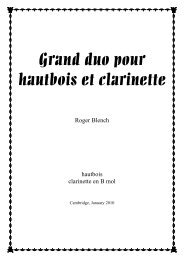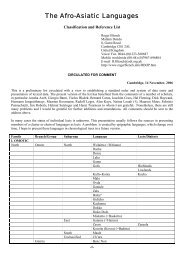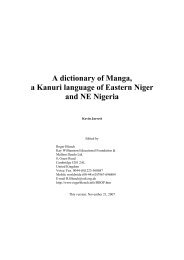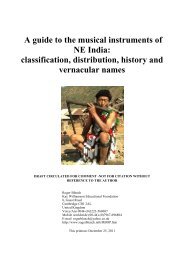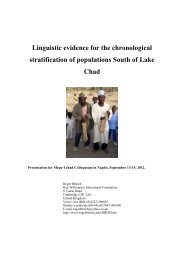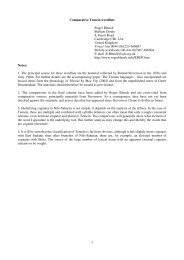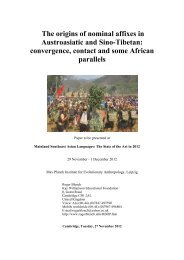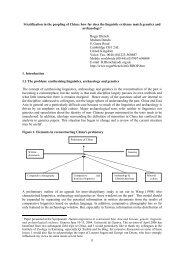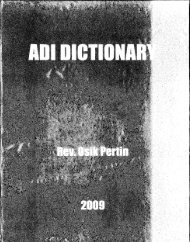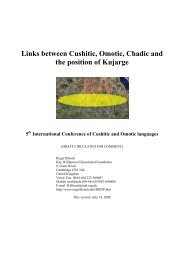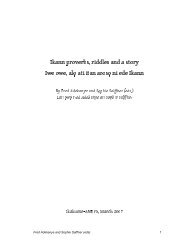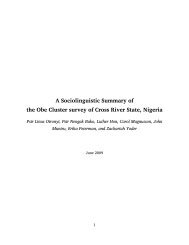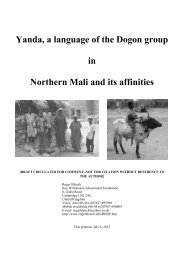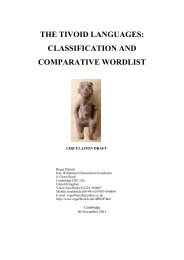Documentation, development, and ideology in the ... - Roger Blench
Documentation, development, and ideology in the ... - Roger Blench
Documentation, development, and ideology in the ... - Roger Blench
You also want an ePaper? Increase the reach of your titles
YUMPU automatically turns print PDFs into web optimized ePapers that Google loves.
124<br />
Stuart McGill & <strong>Roger</strong> <strong>Blench</strong><br />
literacy committee <strong>in</strong>dependent of <strong>the</strong> Bible translation committee. O<strong>the</strong>r<br />
exist<strong>in</strong>g projects should be encouraged to take similar steps.<br />
The biennial Ka<strong>in</strong>ji Language Workshops have proved a good forum for<br />
br<strong>in</strong>g<strong>in</strong>g toge<strong>the</strong>r Muslims <strong>and</strong> Christians work<strong>in</strong>g on language <strong>development</strong>,<br />
result<strong>in</strong>g <strong>in</strong> fruitful discussions about <strong>the</strong> relationship between Bible<br />
translation <strong>and</strong> language <strong>development</strong>. There is no secret that most Christians<br />
<strong>in</strong>volved <strong>in</strong> language <strong>development</strong> <strong>in</strong> Ka<strong>in</strong>ji languages would like to see <strong>the</strong><br />
Bible translated – however it is com<strong>in</strong>g to be recognised that it is better for all<br />
concerned if this is done as one part of a general language <strong>development</strong><br />
movement, ra<strong>the</strong>r than <strong>the</strong> o<strong>the</strong>r way round. As well as <strong>in</strong>creased trust,<br />
ano<strong>the</strong>r benefit of <strong>the</strong> workshop has been <strong>the</strong> establishment of <strong>in</strong>formal<br />
support networks amongst Muslims work<strong>in</strong>g on different projects. Whe<strong>the</strong>r it<br />
can be called ‘applied documentation’ or not, given <strong>the</strong> religious turmoil <strong>in</strong><br />
Nigeria (Section 3), <strong>the</strong> phenomenon of Muslims <strong>and</strong> Christians collaborat<strong>in</strong>g<br />
on language documentation <strong>and</strong> <strong>development</strong> projects to <strong>the</strong> extent described<br />
<strong>in</strong> Section 5.1 must be considered a worthwhile outcome of <strong>the</strong> documentation<br />
process.<br />
Language documenters often face <strong>the</strong> dilemma of whe<strong>the</strong>r <strong>the</strong>y should<br />
become <strong>in</strong>volved <strong>in</strong> <strong>the</strong> dissem<strong>in</strong>ation of religious material. If <strong>the</strong> majority of<br />
<strong>the</strong> speech community are adherents of one particular religion, <strong>the</strong>re is of<br />
course less of an issue. Western language documenters work<strong>in</strong>g with<br />
predom<strong>in</strong>antly Christian communities often become <strong>in</strong>volved <strong>in</strong> produc<strong>in</strong>g<br />
religious material, regardless of <strong>the</strong>ir own beliefs. For example, <strong>in</strong> Oceania<br />
some ELDP-funded grantees have assisted more-or-less wholly Christian<br />
communities with <strong>the</strong> production of vernacular prayer books. Thomas (this<br />
volume) provides ano<strong>the</strong>r example. Similarly, Christian missionaries <strong>in</strong> West<br />
Africa have been known to produce vernacular Islamic products such as <strong>the</strong><br />
‘99 glorious names of Allah’ (Warren-Rothl<strong>in</strong> 2012). In <strong>the</strong> case of <strong>the</strong> Cicipu<br />
Language Project, however, <strong>the</strong> Western project leader (McGill) was <strong>in</strong>itially<br />
reluctant for it to be associated with <strong>the</strong> dissem<strong>in</strong>ation of religious material.<br />
Despite this, both Cicipu documenters were keen to produce religious material<br />
<strong>in</strong> <strong>the</strong> vernacular for <strong>the</strong>ir respective religions, <strong>and</strong> <strong>in</strong> <strong>the</strong> end we came to an<br />
arrangement whereby <strong>the</strong>y can work on such material outside <strong>the</strong>ir project<br />
hours <strong>and</strong> at <strong>the</strong>ir own expense. The very low level of Hausa <strong>and</strong> Arabic<br />
literacy <strong>in</strong> <strong>the</strong> area (even those who can read almost always read halt<strong>in</strong>gly) is<br />
likely to <strong>in</strong>crease <strong>the</strong> impact of such material. In particular, it is likely to be a<br />
more useful aid to literacy than folktales or oral history – people are glad that<br />
such books exist, but <strong>the</strong>y are not so keen to buy <strong>the</strong>m <strong>and</strong> even less ready to<br />
read <strong>the</strong>m. The novelty with respect to Ka<strong>in</strong>ji language projects is not <strong>the</strong><br />
production of religious literature, s<strong>in</strong>ce that is what is expected <strong>in</strong> nor<strong>the</strong>rn<br />
Nigeria, but ra<strong>the</strong>r <strong>the</strong> <strong>in</strong>volvement of Muslims.


